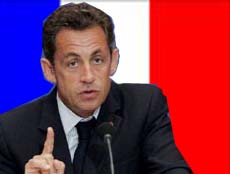Merkel and Sarkozy seek agreement in EU on energy, climate
 Straubing, Germany - President Nicolas Sarkozy travelled to Bavaria Monday to hold talks with German Chancellor Angela Merkel on cooperation on a range of issues ahead of France's assumption of the European Union presidency next month.
Straubing, Germany - President Nicolas Sarkozy travelled to Bavaria Monday to hold talks with German Chancellor Angela Merkel on cooperation on a range of issues ahead of France's assumption of the European Union presidency next month.
Energy policy, including the soaring prices of oil and gas, and climate change topped the agenda of the afternoon meeting in the town of Straubing, aides said.
France and Germany are in dispute over planned EU limits for the vehicle sector, with Germany pressing for its carmaking industry to be able to continue producing luxury vehicles with high fuel consumption and emissions.
The two leaders also marked 20 years since a French-German brigade was established to cement their military cooperation.
Sarkozy paid tribute to Germany's EU presidency in the first half of last year.
"We need Germany," he said. "We are not just friends and allies, we also carry joint responsibility in the service of Europe."
Merkel backed Sarkozy's aims of closer cooperation within the EU on security and defence, stressing that this would buttress NATO.
By contrast, another major EU power, the British, are sceptical of EU defence initiatives, fearing they could harm the transatlantic alliance.
The two leaders met ahead of a joint meeting attended by the Foreign, Defence, Economy and Environment ministers from both sides.
The joint consultations were taking place hours as US President George W Bush was arriving for an EU-US summit in the Slovenian resort of Brdo, where Iran's nuclear ambitions, Russia's growing assertiveness in eastern Europe and divisions over visa-free travel were set to rank high.
The French EU presidency is expected to push through binding rules for the 27 member states to implement ambitious EU greenhouse gas emission targets.
The European Commission, the EU's executive branch, aims to force carmakers to cut carbon dioxide emissions to 120 grams a kilometre across the range they produce by 2012, putting German carmakers at a disadvantage to their French and Italian competitors making economy cars.
The joint ministerial council meetings between the two countries began in 2003. The meetings take place twice a year. (dpa)